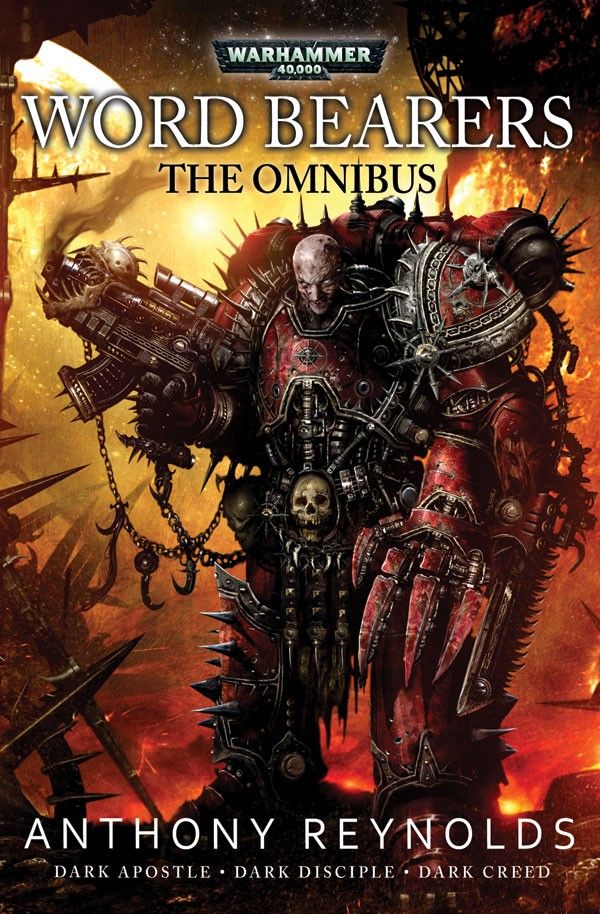I will admit to a certain degree of professional jealousy when it comes to the writings of others. Most of the time it’s when I read something good, which encourages me to push myself, to write more, to craft better stories. I’ll watch John Green spiel into a camera or read Chuck Wendig‘s writing advice or see a particularly amusing or thought-provoking tweet from the likes of Susan Arendt or Amanda Palmer and think, “Man, I can get there, if I just get off my ass and work more at it.” But there’s a darker jealousy I also contend with. It’s the jealousy that comes from reading a published work that is irredeemably, completely, and blatantly awful. This happened with Quest for Karn, it happened with the Warcraft manga, and now it’s happened with the Word Bearers Omnibus, a trio of Warhammer 40,000 novels collected into one bulky volume for easy shot-putting through the nearest window.

The Word Bearers are a legion of the infamous Chaos Space Marines, genetically enhanced super-soldiers who betrayed their Emperor in favor of the gods of Chaos for reasons I’m not going to get into. The ranks of the traitors are many and varied, from the foaming-at-the-mouth World Eaters to the stoic and eerie Thousand Sons. The Word Bearers are a middle-of-the-road bunch of incredibly powerful killers, favoring a unified approach to the Chaos god foursome over following a single deity. While twisted and warped, theirs is a doctrine based on faith, and the potential is there to examine and explore what motivates and perpetuates the hearts and minds of those bound to such a doctrine.
I spent most of Dark Apostle, the first book in the omnibus, waiting for these ideas to arise, then I waited for the story to get going. For a long time, Anthony Reynolds introduces us to characters and begins fleshing them out just before killing them, often in a rather grotesque fashion befitting the grim darkness of Warhammer 40,000’s dark future. If a character doesn’t die and isn’t a Chaos Space Marine, than something even more horrible is going to happen to them the next time we see them. It does something that is the death knell of just about any work: it makes things dull. The repetition not only defangs the entire enterprise right from the start, it kills the story’s momentum and throws the pace way off. On top of this inherent flaw, the main characters, the Word Bearers of the title, are also dull and uninteresting. Their rivalries are flat and boring, and their battles are unexciting. A lot of bolters get fired into a lot of chests and a lot of faceless humans are killed instantly by this. Reynolds just really likes to talk about it.
Dark Disciple began, and to be honest, I was waiting for a twist. If the first novel was just so much ‘bolter porn’ to draw in some of the target audience of the miniatures game, perhaps the author was setting things up to become more interesting later on. Perhaps this is part of my disappointment, expecting this sort of development, as it never showed up. More bolter fire, more pointless characters, more dull and uninteresting ranting on how weak the false Emperor is and how his followers need to suffer as gloriously as possible. The story has no momentum, the characters have little motivation, and stakes never escalate, meaning the ultimate end of this tedious tale is a tedious ending. Considering all the things that could be done with warrior-priests of Warhammer’s interesting pantheon of Chaos gods, the disappointment merely deepens.
I must confess I only read the first few pages of Dark Creed. I was not invested in any of the characters. I was not interested in how the plot was developing. Reynolds had had two whole novels to engage me, and had failed utterly in doing so. I actually started to feel anger at the book in my hands, which somehow had stumbled into publication likely due to its licensed tie-in nature, and its author, who really should have known better than to waste so much time with this absolutely interminable dreck. For a cadre of warriors chosen by both the Emperor and the Chaos gods for their faith and their skill in battle, there’s no real conflict to be had in any of this story, not in any of the three novels. There’s no scheming by or on behalf of the Chaos gods, no interesting rivalry or betrayal within the ranks as they vie for position, nothing. Everything plays out in the most flat and boring ways possible, any potentially engaging plotting or characterization is smacked down almost the moment it’s raised, and even possessed chainswords and face-violating tentacle masks can’t save this entire omnibus from being a complete waste of time.
With all of the potential tension and rivalries between the Chaos gods, the inherent dichotomy of the nature of faith with the nature of perpetual warfare, and the colorful history of the Warhammer 40,000 universe, the Word Bearers Omnibus could have been an interesting work of licensed fiction. It could have cast the villains of many a tale in this setting as complex, diverse characters instead of just heretics to be gunned down. Instead, we get over 700 pages of pointless gore and meandering plot that goes nowhere and adds nothing to either the overall fabric of the universe or our lives. Save yourself the time and money this omnibus would waste, and skip it. I hear there are better novels on the Word Bearers in the Horus Heresy series, and I may check those out. This, however, shames the followers of Chaos, and the devotees of the dark gods should likely destroy it on sight. I could see followers of Khorne, especially, getting so pissed at its go-nowhere story and flat, dull characters that they start eating it.



Leave a Reply